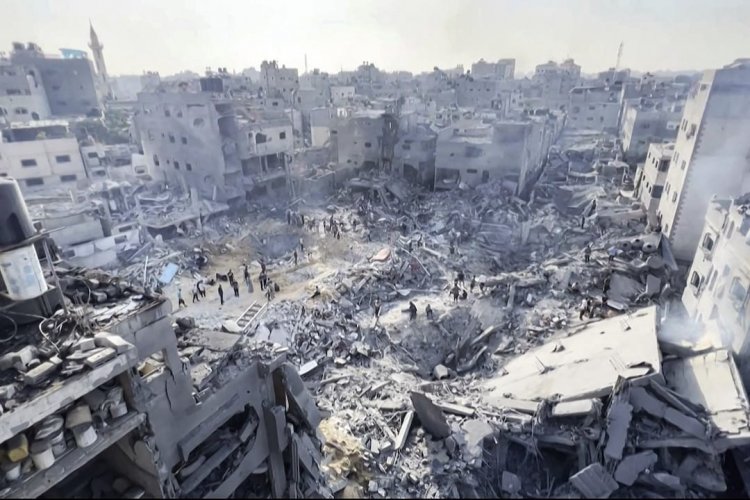Gaza War Comes Close to South Asia
STORIES, ANALYSES, EXPERT VIEWS

The conflict that has been raging in Gaza was so far a distant event for India. No longer. The Houthis, by disrupting traffic though the Red Sea-Suez Canal area, forced the Indian Navy into action once a ship near India’s contiguous maritime zone faced a drone hit. And, the Iranian attack on alleged terror bases in Balochistan and Pakistan’s retaliation against targets in Iran has brought the war much nearer South Asia. Any escalation could affect the Strait of Hormuz, through which flow over 20 million barrels of oil per day, constituting one-fifth of global consumption.
Impact of Red Sea on India
For India, it is a matter of some concern that a spate of attacks on cargo ships in the Red Sea since November has turned the quickest marine route linking Asia with Europe through the Suez Canal unsafe. It has forced freighters to take a longer transit around the Cape of Good Hope in Africa’s southern tip, making shipments both dearer and longer to deliver.
Impact on Indian trade: According to the Federation of Indian Export Organisations’ Director-General Ajay Sahai, almost 90% of western hemisphere cargo, both inbound or shipped from India, that used to go through the Red Sea is now getting re-routed through the Cape of Good Hope. Whether exporting to Europe, the U.S. east coast and even to countries in North Africa, the longer route is being used. The remaining 10% of Indian import or export cargo is either not moving or using a transit facility.
Impact varies on the type of buyer-seller contract: The impact of this move varies on the type of buyer-seller contract. If it is FOB (free on board), the freight burden is on the buyer, and in CIF (cost, insurance and freight) or C&F (cost and freight) contracts, the freight has to be borne by the exporter. In cases of FOB, and where the buyers have comfortable inventory, they are asking the Indian exporter to hold back consignment. Likewise, exporters who have to bear the freight are requesting their buyers to allow them to hold the consignment given the increase in freight costs, which includes peak season surcharge and contingency surcharge. However, Ravi Kumar (Senior Deputy Editor, The Hindu) states “if there is zero inventory, the buyer would insist on shipment of the goods.”
‘Roughly 20-25% consignments are being held up. Container Corporation of India is saying about 25% of its containers are being held back by Indian exporters. Everybody is hoping the situation will normalise shortly, but looking into recent developments we are still keeping our fingers crossed,’ adds Sahai. While all consignments are likely to be impacted by the increase in freight cost — by up to six-fold in some cases — and the longer voyage time, the pinch would be felt most by low-value, high-volume cargo as well as perishables.
Both import and export cycles have elongated: Besides the extra time taken on account of the longer route, Sahai states the developments could make imports costlier and call for better inventory management. While the impact on some critical imports are being assessed, both import and export cycles have elongated.
India’s import dependence on oil: Also, the crisis could result in final products turning dearer. For instance, the Red Sea crisis could come in the way of any plans to reduce pump prices of petrol and diesel. Gross imports of crude oil and petroleum products as a share of India’s gross imports in value terms was 25.8% in 2022-23, and 22.6% in the first half of the current fiscal. In fact, India’s import dependence (based on consumption) in the April-September 2023 period was 87.6%, according to the government’s Petroleum Planning and Analysis Cell.
Recruiting workers from India to replace Palestinians in the Israeli workforce
According to some reports, in a related development, India has allowed an Israeli team to start recruiting workers from India to replace Palestinians in the Israeli workforce. This is a dangerous move, according to Singh “that can cause ripples in the Arab world and generate anti-India sentiments. In the six Gulf Coordination Council nations, the eight million Indians, who mostly hold blue-collar jobs, could face a backlash.
In conclusion, Israel’s Gaza operation needs to end very soon. Israel also requires not only a change of government but a more moderate and accommodative administration. An interim governance mechanism is needed for Gaza and the West Bank. The US is reportedly asking the Saudis and Emiratis to take up that task. Huge financial aid would be needed for reconstruction and rehabilitation of over two million people without jobs, medical care, schools and homes. Even if all the above happens, the region would still be at the starting point of a more peaceful West Asia. Meanwhile, the risk of a slip between the proverbial cup and the lip looms over the entire region.
















